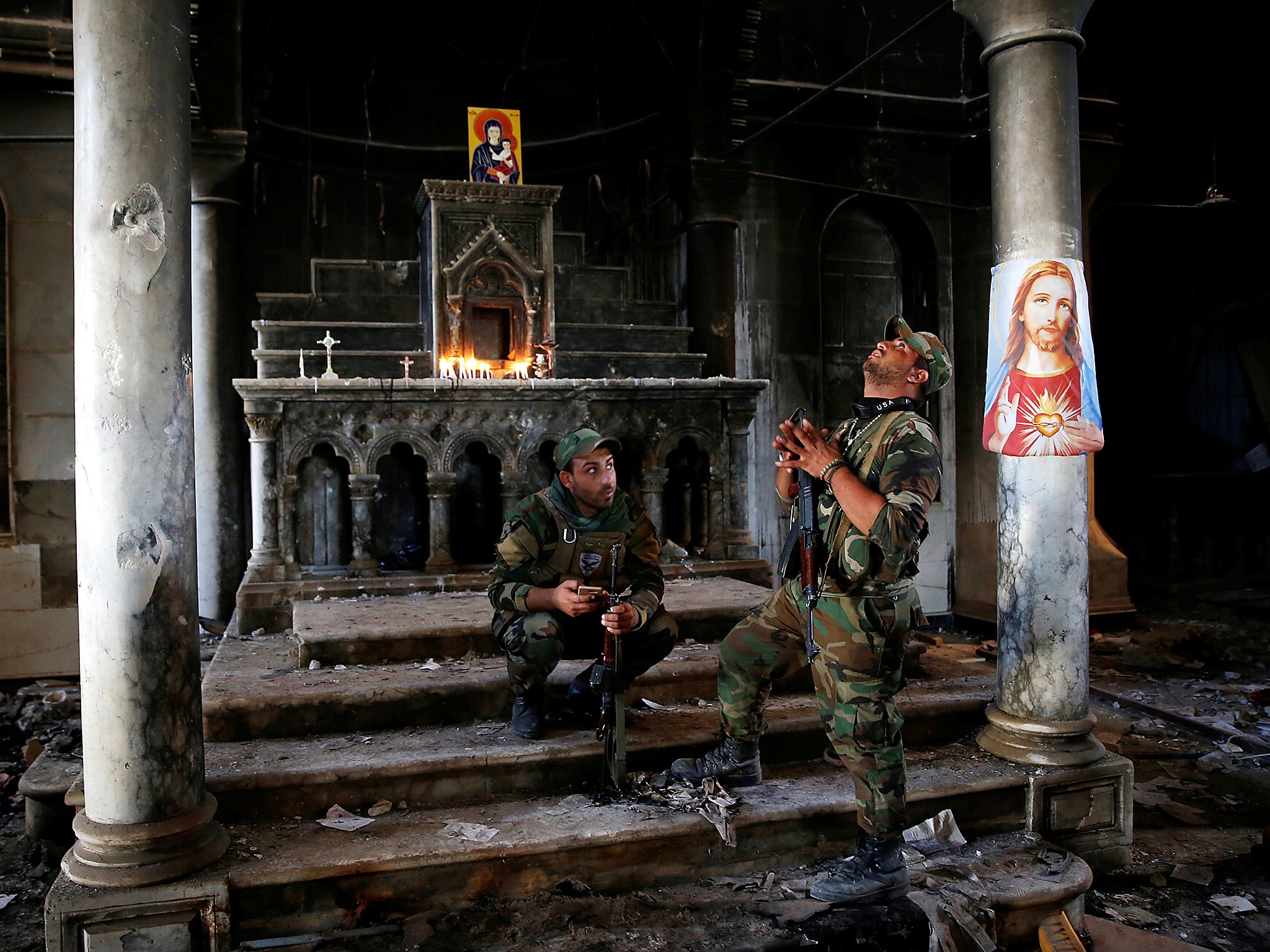A dark chapter in Mosul's history will soon be over – and Iraq is becoming united again
The increasing unity of Iraqi communities has defied predictions of the sectarian destruction of the country

Iraqi Security Forces are embarking on a final and decisive campaign against Isis to liberate Mosul, an ancient city that has endured more than two years of brutal terrorist occupation. This dark chapter will soon be another episode in the province’s 3,000 year history.
The coming victory will represent a crushing blow to the terrorists’ dream of statehood, and will deter those who seek to join a collapsing organisation. The criminal terrorist gang we call Isis gained strength in 2014 from a seemingly unstoppable expansion. This image of invincibility is now in ruins.
The battle will see a diverse coalition of Iraqi forces. From the eastern axis of advance, a joint force of the Iraqi Army’s 9th Armoured Division, Counter-Terrorism Services and Kurdish Peshmerga are moving from Khaza and Bashiqa, while the Iraqi Army's 15th Division is moving from the south. Meanwhile, Iraqi Security Forces are protecting the vital Mosul Dam. In the desert to the west of the city, Isis can be easily spotted from the air, and cannot escape.
South of the city, Iraqi Security Forces supported by Sunni tribal fighters, Christian volunteers and the Popular Mobilisation Forces (PMF) are securing ground to ensure Isis cannot attack rear areas. The latter group are volunteers who have publicly pledged that the “bells of Mosul’s churches will ring again.” On 21 October in the Christian town of Bartella, this pledge came true. The PMF are now cutting off Isis at Tal Afar.

The increasing unity of Iraq's communities has defied predictions of the sectarian destruction of Iraq. There are now thousands of Sunni fighters on the front lines, with Christians, Yazidis, Turkmen and others. Iraq is moving beyond its troubled history.
In this effort, the UK has been particularly respectful of Iraqi sovereignty. From the start, we have maintained that Iraq must win the battle on the ground alone. Our allies have been overwhelmingly supportive of this aim, helping to build regional cooperation in maintaining the fight against Isis. We hope that the kind of international cooperation happening in Iraq will provide the basis for the campaign to continue in Raqqa, to ensure that Isis will not cross the border into Iraq again.
During months of preparation for the Mosul battle, every nation and force on the ground was given an agreed and carefully designated role coordinated with Baghdad, and we hope this coordination continues.
A united effort is vital because the threat is a common one. Isis has reminded us of this in murderous attacks from Paris to Ankara, Orlando and beyond. In Iraq, violence targeting people of all ethnic and religious backgrounds has increased the sense of unity among Iraq’s communities. While we long for this suffering to end, we also understand that in the wider world, Isis represents an ideological disease which will require a unified international response.
Outside Mosul, a major effort is underway to provide for the many civilians who will be displaced by the fighting. The Iraqi government expect this figure to be between 700,000 and one million refugees. Since 2014, the Iraqi government has assisted the mounting number of people displaced by violence, a difficult situation following the more than 50 per cent decline in oil prices since 2014.
Despite these difficulties, the Iraqi government has begun restoring services to cities such as Ramadi, while in Tikrit markets are once again busy following liberation. Unfortunately, the scale of the offensive in Mosul means we will need sustained international support. This must take the form of a long-term plan for social and economic assistance in the aftermath of this war, to help stabilise the wider region.
To this end, the Iraqi government has a multi-phase plan to resettle internally displaced people (IDPs). For each phase of this plan, the Prime Minister’s Office will lead a high-level committee who will see operations through to a final reconciliation phase. The first committee will be responsible for demining Mosul and clearing unexploded bombs, working with the Ministry of Environment. Working in parallel, a second committee will oversee the restoration of basic services while a third committee will work on restoring the capability of local police forces, ensuring security for returnees. Lastly, larger reconstruction projects will be overseen by the High Committee for the Relief of Displaces Persons. The governor of Mosul will head a crisis cell, coordinating reconciliation efforts for longer-term peace.
Here, the UK has proved a reliable ally, donating £40m towards humanitarian aid for the Mosul offensive, a part of more than £150m overall assistance from the UK since June 2014, and $2.1bn pledged at the 24-nation donor conference for Iraq in Washington in July. Unfortunately, the challenge in Mosul is so great that the UN may be 50 per cent short of the funds required to construct enough refugee camps.
Even considering these many challenges, we are confident that civilians will be resettled, and that Iraq will move beyond this tragic era. Iraq is an ancient nation, from the first known writing of the Sumerians more than 5,000 years ago to the pioneering study of algebra and medicine in 9th century Baghdad.
Soon the attempts by Isis to erase this history will have failed completely. We are confident that our people’s strong endurance after this period will lead to a better future, for all of Iraq’s communities.
Salih Hussein Ali Altamimi is Ambassador of the Republic of Iraq to the UK
Join our commenting forum
Join thought-provoking conversations, follow other Independent readers and see their replies
Comments
Bookmark popover
Removed from bookmarks